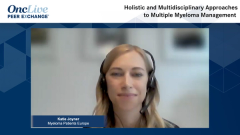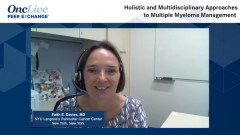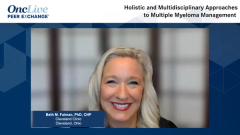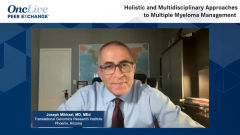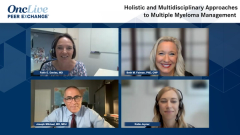
Importance of Clinical Trial Enrollment in Multiple Myeloma
Key opinion leaders in multiple myeloma management elucidate the value of clinical trials and share enthusiasm for improving enrollment when possible.
Episodes in this series

Transcript:
Faith E. Davies, MD: It … leads quite nicely on from that, making sure as a community we’re providing the correct evidence for not only our effectiveness of our therapies, but also to ensure that patients can actually access them. And so … Beth, I’d like to come to you and talk a little bit about why clinical trials are so, so important.
Beth M. Faiman, PhD, CNP: So, I’m very passionate about clinical trials, as we all are on this call, because many of us started in the myeloma field in the 1990s, 2000s, when we had 1 drug … to questionably effectively treat myeloma. That was really the stem cell transplant. But from the melphalan and prednisone days to now, it’s just mind blowing. So, I’m a great advocate and I try to eliminate my clinician bias. So, if I see a patient in my office, whether they are newly diagnosed or [a] relapsed/refractory patient, I am always, as are my colleagues, screening for a clinical trial. Just because somebody lives an hour and a half away doesn’t mean that they won’t find the resources or have the resources to travel back and forth to the center. In the US, we are so fortunate that, in many cases, there are reimbursement structures available for travel. If it’s on a clinical trial, some of the companies will pay for some travel or an overnight hotel stay.
And then … through the institution, we have some benefits, as well. So, not only will individuals have access to … potentially promising therapies that they might derive early benefit from, but actually, it will not only help them, but others. So that’s my piece about the clinical trials. And again, we have implicit biases where we just don’t think that person is going to be a good candidate for the clinical trials. But please, if you’re watching this and you’re a community practitioner, refer to a local center. Clinicaltrials.gov is the government database that we use in the United States. And I’m always screening for studies through clinicaltrials.gov, as well as the International Myeloma Foundation, Multiple Myeloma Research Foundation. So, I’m pointing patients to these websites.
So, they’re on the Facebook groups or the WhatsApp groups. They hear about this drug, and they say, type in here and find out where that might be available to you. And this is actually an international database. So, if you’re in Brisbane, Australia, you still might be in the clinicaltrials.gov if there are also US sites. So, clinical trials, we can’t be where we are now today without where we started. We heard from the panel also about how drugs were pulled back because we didn’t have the sophisticated advanced data and they didn’t meet their primary end point. So, making sure we get these well-designed clinical trials so that we can get greater access to all.
Faith E. Davies, MD: Lovely. Thank you, Beth. Katie, I’m guessing that many patients phone MPE [Myeloma Patients Europe] to ask about clinical trials, either … how did they get involved or what are they? How do you guys handle those kinds of questions?
Katie Joyner: So ... there’s a real need for information in Europe around accessing clinical trials. That was the real call we heard from our members is that they don’t know … where to find the information and they don’t know how to find out about trials that may be happening in their country. So, while clinicaltrials.gov is certainly an important resource, it’s not the most patient-friendly and it’s certainly not available in a local language. So, in order to address this need, MPE is developing a clinical trial search tool for recruiting myeloma, as AL amyloidosis trials in Europe, to help meet that need among our members in Europe. So, the US has several really great patient-friendly tools and it’s time that we have one for our patients here. So, this will allow patients to use … basic and advanced search criteria to find trials that are available in their country and to take that information and have an informed conversation with their clinician.
And we know, of course, that bias exists … everywhere. And so, clinicians might not suggest a trial for patients or they might not be aware of certain trials that are happening outside of their own hospital. And so, we want to make sure that the patients have the information they need to have those conversations and make the best decision for themselves. The other challenge, of course, that we face here is that significant difference in availability of trials in Europe. You have, obviously, a lot of trials happening in Western Europe, some great examples of improved access to trials in Central and Eastern Europe, in Poland and the Czech Republic, and then countries that haven’t had a myeloma trial in the past decade. So, that’s the other really big challenge we’re seeing here, where patients are interested in enrolling in a trial and aren’t able to because of that.
Faith E. Davies, MD: I know. That’s really interesting. Thank you, Katie.
Transcript is AI-generated and edited for clarity and readability.


